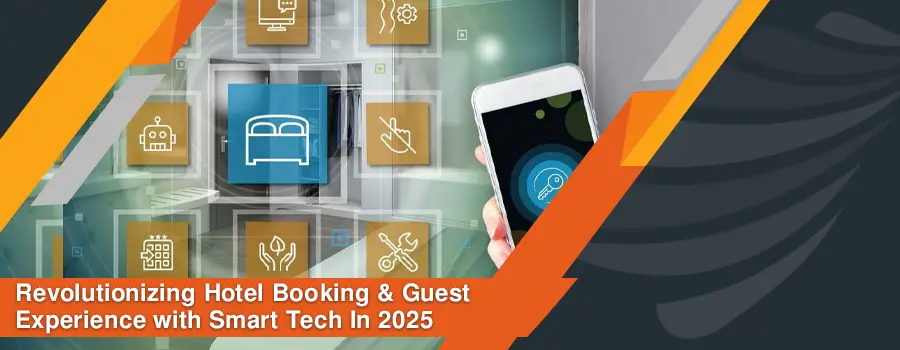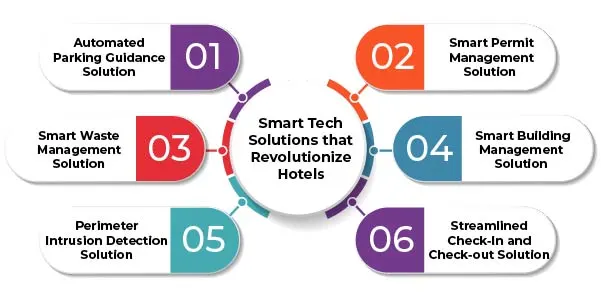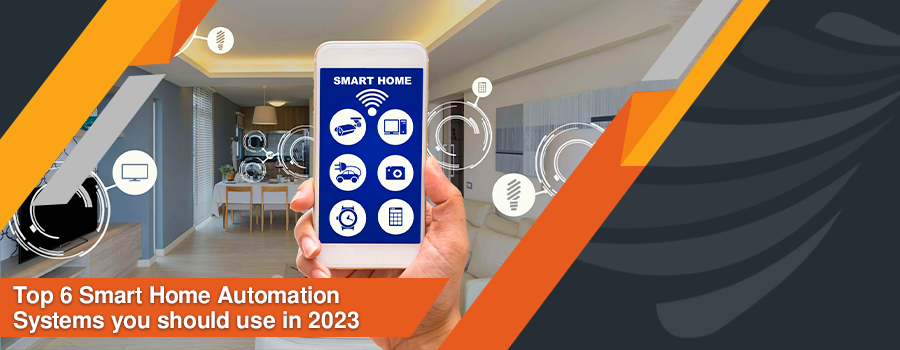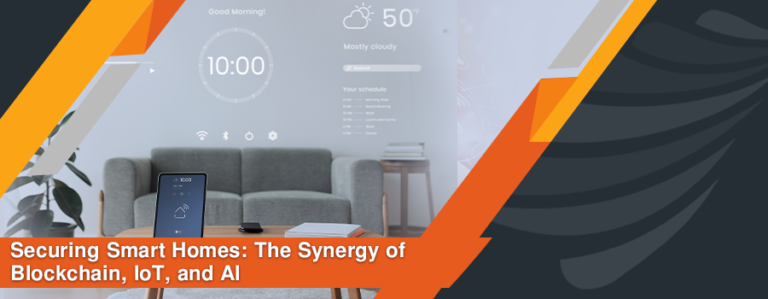The hotel industry is on the brink of transformation. Smart technology adds luxury, convenience, comfort, and security, enhancing the guest experience and increasing booking opportunities. With smart tech solutions, the whole environment is managed intelligently, ensuring the best personalized experience from booking to departure.
Imagine you don’t have difficulty finding a parking lot and getting a parking permit when you enter a hotel. With smart parking and permit management solutions, you can easily navigate to the parking spot in real-time and pay for the permit online without any hassle. Also, the parking enforcement solution is there to detect unauthorized access, which is necessary for your security.
The facilities do not stop there. You get a room where temperature, light, humidity, water temperature, and music are set according to your wishes. You are also not worried about the environment as the hotel has adopted a waste management system followed by automated sorting and optimized recycling to ensure an eco-friendly environment.
It is not a far-off dream but a reality that smart technology solutions are revolutionizing the hospitality experience. From seamless booking via AI-powered apps to fully personalized room environments, the future of the hospitality industry is all about adding comfort, convenience, and customizations. As hotels adapt to technological shifts, clients get secure, personalized stays where technology meets all their needs.
Let’s delve into this blog to explore different traditional and smart hotels and how different smart tech solutions aid in increasing hotel booking and enhancing guest experience.
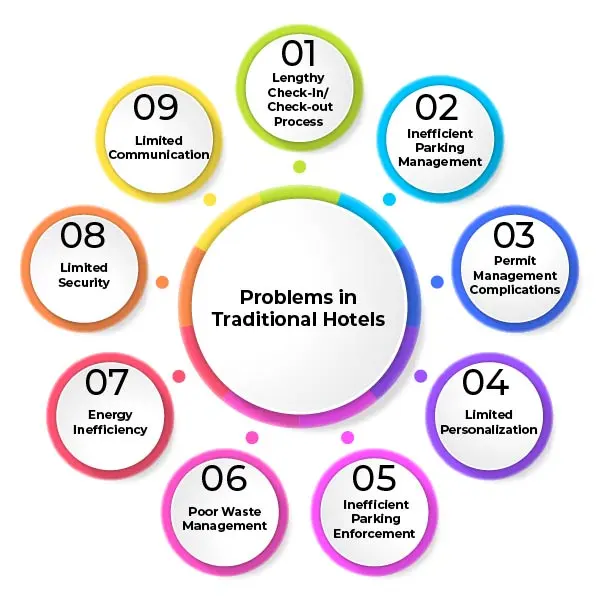
Problems in Traditional Hotels
Common problems in traditional hotels that affect hotel reputation, guest experience, and number of bookings are:
1. Lengthy Check-In/Check-out Process
Traditional hotels have manual check-in/check-out processes, which lead to delays and frustrations. The chances of human errors are also high, which causes guests to suffer.
2. Inefficient Parking Management
Due to the increasing demand for parking, it is becoming difficult to manage manually. Drivers also face issues in finding available parking spots.
3. Permit Management Complications
Drivers face delays due to the manual management of parking permits. Staff processes each permit individually, which becomes hectic for management and clients, especially during peak times.
4. Limited Personalization
Providing a personalized experience is crucial for satisfying clients. However, traditional hotels struggle to do so due to limited resources. This leads to low client satisfaction rates, referrals, and rebooking.
5. Inefficient Parking Enforcement
Manual car parking and management leads to a high rate of improper parking. Without automated systems to enforce regulations and detect illegal parking, it becomes difficult to avoid congestion, frustration among guests, and misuse of parking spaces.
6. Poor Waste Management
Guests are concerned about hygiene, sustainability, and an eco-friendly environment. However, due to limited waste tracking and recycling systems, traditional hotels find it difficult to manage a large amount of waste efficiently without compromising environmental concerns.
7. Energy Inefficiency
Due to a lack of smart control in traditional hotels, they consume a lot of gas and electricity, leading to high operational costs, equipment failure, and environmental footprints.
8. Limited Security
Security in traditional hotels is limited. They have basic physical measures and surveillance, leading to inefficiency in promptly monitoring and responding to any casualty. This risks client privacy, their personal belongings, and even their lives.
9. Limited Communication
The traditional hospitality industry has outdated communication systems like landline phones, manual request logs, and registers. Guests need to call the front desk for any service, which leads to delays and confusion. Staff communication is often face-to-face and walkie-talkies, making it difficult to respond efficiently and handle any emergency promptly.
What are Smart Hotels?
A smart hotel has advanced technologies like the Internet of Things (IoT) and Artificial Intelligence (AI). These integrations allow the installation of smart solutions to improve management, operational efficiency, and control and ensure high customer satisfaction.
Why are Hotels shifting towards Smart Tech Adoption?
Hotels are shifting towards smart tech adoption because of several reasons:
1. Enhanced Guest Experience
The hospitality industry’s competition depends on how much guests get comfortable, personalized, and seamless experiences. To stay ahead of the competition, hotels must adapt smart technology-based solutions to provide a personalized guest experience, enhance security, and provide guidance.
2. Operational Efficiency
Smart technologies streamline many traditional processes that hotels rely on, like maintenance, management, security, and even housekeeping. Adopting automated systems allows staff to focus on critical tasks and rely on smart solutions, saving time, reducing human error, and enhancing operational efficiency.
3. Cost Reduction
Smart technological solutions automatically control energy-consuming systems, such as HVAC, lighting, and waste management. These adjustments are based on real-time occupancy and client behavior data, leading to long-term savings.
4. Enhanced Security
Real-time surveillance, facial recognition, intrusion detection, and digital key systems provide a more secure environment for staff and guests. These modern solutions ensure guests have a safe experience throughout their visit, from entry to exit.
5. Competitive Edge
The hospitality industry is highly competitive. Hotels that adopt smart technology offer cutting-edge services that attract guests from all over the world. By sticking to modern solutions, hotels can make a strong brand image and stay ahead in the competitive market.
6. Data-driven Insights
Smart technology gives hotels valuable insights into client preferences, behavior, and operational performances. The data is further used to make informed decisions, optimize performance, drive growth, and target market competitively.
6 Best Smart Techs that Revolutionize Hotels
1. Automated Parking Guidance Solution
Parking in hotels, especially during peak hours, can be frustrating and time-consuming. Hotels are adopting automated parking guidance solutions like ParkSmart to overcome this issue. These solutions allow guests to find nearby parking spots via mobile apps and digital signage. They can also book online parking spots and enter the hotel without hassle.
A separate web/mobile app interface allows admins to monitor parking lots, check parking status, and detect cars overstaying their booked time.
2. Smart Permit Management Solution
Managing parking permits, especially at events or parties, can be prone to errors and is time-consuming. Manual paperwork leads to delays and inefficiencies.
Hotels overcome these issues by deploying smart permit management systems like Calamus, which automate the issuance and monitoring of permits. These systems streamline the workflow, allowing guests to receive digital permits, eliminating delays, and improving operational efficiency.
3. Smart Waste Management Solution
Hotels produce around 289,700 tonnes of waste annually worldwide. Considering this, sustainability is a growing concern in the hospitality industry.
By adopting smart waste management solutions like BinWise, hotels track and monitor the waste collection and fill levels in the bins by collecting real-time data through smart wireless sensors. This IoT-based advanced waste management technology helps facility managers reduce operating costs, plan efficiently, and provide better waste management services.
4. Smart Building Management Solution
Managing hotels’ resources and energy consumption can be daunting without using the right methods and technologies. Manual handling of hotel resources leads to higher costs, energy waste, poor waste management, waste or gas leaks, and equipment failure.
The adoption of smart building management solutions like HIVE controls and monitors every piece of equipment and resource, such as lighting, temperature, and humidity. It also detects any abnormalities in the building, such as water leakage, equipment failure, and smoke. This leads to enhanced energy efficiency, cost savings, and building maintenance, ensuring guests a comfortable and secure experience.
5. Perimeter Intrusion Detection Solution
Security is a major concern for people who need to book hotels. Traditional hotels often rely on manual monitoring, which increases the risk of intrusion attempts.
Adopting perimeter intrusion detection solutions like AssetGuard provides real-time intrusion detection and monitoring. This way, it detects unauthorized access to the hotel premises and alerts security staff, who respond promptly. With AssetGuard, hotels can ensure the safety of their guests and protect them properly from secure beaches.
6. Streamlined Check-In and Check-out Solution
One of the most frustrating aspects of hotel stays for guests is the long wait times during check-in and check-out. Traditional methods often involve standing in queues, filling out forms, and dealing with paperwork, which can leave a negative first and last impression.
To solve this issue, smart hotels are now adopting self-service kiosks and mobile apps, allowing clients to handle the entire check-in and check-out process on their mobile phones. On the mobile app, they can enter all their details, book, pay, and check out, allowing them to instantly get their room and leave the hotel. Adopting smart technology eliminates the need for physical interaction, leading to long waiting times and chances of errors and mismanagement.
Future Outlook of the Hospitality Industry
The hospitality industry’s future is revolutionizing with advanced technologies like AI, IoT, image processing, and augmented reality.
One of the futuristic ideas that guests may soon experience is biometric-based personalization. It allows management to give personalized experiences to clients that go beyond the present integration of smart technologies. A facial recognition system detects guests’ faces instantly, and data is driven from the cloud. According to the data of previous client preferences and behavior or the data entered by the guests in the mobile app before arriving while making a client profile, the client room will be set, followed by regulating temperature, humidity level, lighting, and music. Even the client’s favorite meal or refreshment can be prepared according to the client’s preference.
Another example is the integration of Virtual Reality to give clients an immersive experience. Before booking, they can do virtual tours of the hotel to get all the details and see how their booked room will look without needing to visit physically. While staying in the hotel, guests can enjoy virtual-reality city tours and attend virtual events. They can also play games and attend fitness classes or virtual spas to remain entertained. The inclusion of these technologies attracts tourists who want to get a unique, enjoyable, and comfortable experience.

